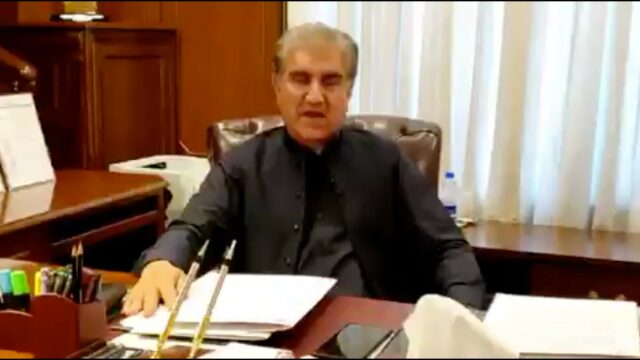NEW DELHI: ‘A storm in a teacup’ or just a hiccup. Either way (or worse), Pakistan’s long-standing ties with Saudi Arabia—a relationship leavened by Islam, oil and periodic infusions of cash—are under intense scrutiny ever since Foreign Minister Shah Mahmood Qureshi warned in a TV chat show in Islamabad on Wednesday that if the Saudis did not call an OIC meeting on Kashmir, Pakistan would work with other Muslim countries to organise such a summit.
His exact words were: “Pakistan cannot wait any further… I am once again respectfully telling OIC that a meeting of the Council of Foreign Ministers is our expectation. If you cannot convene it, then I’ll be compelled to ask Prime Minister Imran Khan to call a meeting of the Islamic countries that are ready to stand with us on the issue of Kashmir.”
The remark was unprecedented. Pakistani leaders, civil and military, are never known to talk down, threaten or disparage the Saudis in public. It is the original, older “Iron Brother” (China is the more recent), with links dating back to Pakistan’s birth as a nation. Hundreds of thousands of Pakistanis live and work there; the kith and kin of Pakistan’s civil/military elite live comfortable lives there as did Nawaz Sharif when he was thrown out by Gen. Musharraf in a coup in October 1999. The Saudis have bankrolled Pakistan for decades, more recently with a loan of $2 billion.
So why did Qureshi go public with his grouse? He implied that the government was under pressure over Kashmir. “We have our own sensitivities. You have to realise this. Gulf countries should realise this,” he said, adding that “I am taking a position despite our good ties with Saudi Arabia.”
Perhaps Qureshi was hinting at pressure from the army, which may have seen a need to up the diplomatic noise on Kashmir given that it is now one year since India reduced the state to a Union Territory and carved Ladakh out as another. There could be pressure from Jihadi groups worried over how to sustain terrorism in Kashmir. Qureshi’s comments could also be reflective of Prime Minister Imran Khan’s frustration over his government’s inability to shape the international and domestic narrative on Kashmir.
The Saudis did not dignify, at least publicly, Qureshi’s querulous complaints. But they demanded the return of $1 billion loaned to Pakistan, which had been renewed only six months ago. The Pakistanis were in no position to pay back that sum, a point well understood by the Saudis. This could have been their way of telling the Pakistanis off. Result: Islamabad had to borrow the sum from China to pay off Riyadh. The Saudis were making a point: Pakistan cannot afford to take them on and threats of an “alt-OIC hinted at by Qureshi, was just hot air.
Some Indian diplomats speculate that the U.S. may have even encouraged Riyadh to turn the screws on Pakistan to ensure its continued compliance on Afghanistan or on terrorism.
Does this episode confirm China’s growing leverage over Pakistan? It was only a few days ago that the two joined hands to push for a discussion on Kashmir at the UN Security Council. The initiative failed to muster support. “But it underscores a view here that China will leverage its hold over Pakistan to make things as difficult as possible for India, in Kashmir and elsewhere,” says Lt. Gen. SL Narasimhan, member of the National Security Advisory Board.
However, he believes that China would act with circumspection since it would not want to trigger any move at the UN that would bring the focus on Xinjiang and its treatment of the Uyghurs.
Last point, Qureshi’s threat to get other like-minded Muslim states to form some kind of an “alt-OIC” suggests Pakistan is endowed with qualities that could give it leadership of the Muslim Ummah. Recall last December, when Imran Khan dropped out of a meeting on Kashmir called in Kuala Lumpur. The only ones to turn up were Turkey and Qatar.
“Pakistan by itself cannot hope for any leadership role in the Muslim Ummah given that it figures low on the Ummah totem pole,” says Sushant Sareen, Pakistan scholar at Delhi’s Observer Research Foundation, adding that “the Arabs probably figure at the top of this pole, followed by Iran and then possibly the Turks.”
It’s well known that Turkey and Iran hope to emerge as leaders of the Muslim Ummah but that mantle has been Saudi Arabia’s for decades, Sareen argues, and that situation looks unlikely to change given that Turkey brings little to the table, while Shia Iran is disliked by the largely Sunni Ummah. Malaysia, which was earlier rooting for the “alt-OIC” seems to have distanced itself with the departure of prime minister Mahathir Mohamad and the entry of Muhiyuddin Yassin.
The crowning irony of course is the OIC not discussing the Uyghur issue despite the wealth of evidence about China’s human rights abuses. Muslim unity remains a chimera, the Qureshis of this world notwithstanding.
Thirty eight years in journalism, widely travelled, history buff with a preference for Old Monk Rum. Current interest/focus spans China, Technology and Trade. Recent reads: Steven Colls Directorate S and Alexander Frater's Chasing the Monsoon. Netflix/Prime video junkie. Loves animal videos on Facebook. Reluctant tweeter.





